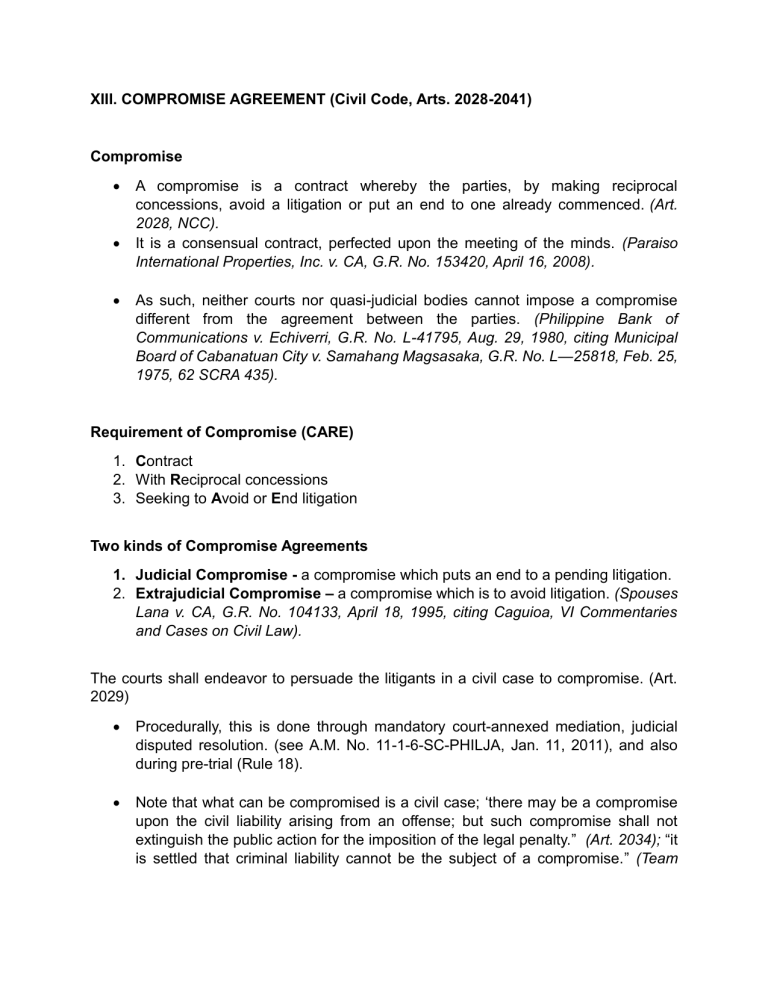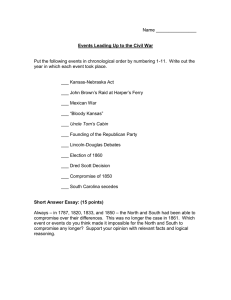
XIII. COMPROMISE AGREEMENT (Civil Code, Arts. 2028-2041) Compromise A compromise is a contract whereby the parties, by making reciprocal concessions, avoid a litigation or put an end to one already commenced. (Art. 2028, NCC). It is a consensual contract, perfected upon the meeting of the minds. (Paraiso International Properties, Inc. v. CA, G.R. No. 153420, April 16, 2008). As such, neither courts nor quasi-judicial bodies cannot impose a compromise different from the agreement between the parties. (Philippine Bank of Communications v. Echiverri, G.R. No. L-41795, Aug. 29, 1980, citing Municipal Board of Cabanatuan City v. Samahang Magsasaka, G.R. No. L—25818, Feb. 25, 1975, 62 SCRA 435). Requirement of Compromise (CARE) 1. Contract 2. With Reciprocal concessions 3. Seeking to Avoid or End litigation Two kinds of Compromise Agreements 1. Judicial Compromise - a compromise which puts an end to a pending litigation. 2. Extrajudicial Compromise – a compromise which is to avoid litigation. (Spouses Lana v. CA, G.R. No. 104133, April 18, 1995, citing Caguioa, VI Commentaries and Cases on Civil Law). The courts shall endeavor to persuade the litigants in a civil case to compromise. (Art. 2029) Procedurally, this is done through mandatory court-annexed mediation, judicial disputed resolution. (see A.M. No. 11-1-6-SC-PHILJA, Jan. 11, 2011), and also during pre-trial (Rule 18). Note that what can be compromised is a civil case; ‘there may be a compromise upon the civil liability arising from an offense; but such compromise shall not extinguish the public action for the imposition of the legal penalty.” (Art. 2034); “it is settled that criminal liability cannot be the subject of a compromise.” (Team Image Entertainment, Inc. v. Solar Team Entertainment, Inc., G.R. No. 191652, Sept. 13, 2017). If either or both parties express a willingness to compromise, or one party offers to compromise (even if the other party refused the offer), the civil action/proceeding shall be suspended. (Art. 2030) If a losing party showed a sincere desire to compromise, the courts may mitigate the damages to be paid. (Art. 2031) Court approval is necessary for compromises entered into by (GRAPE) (Art. 2032): 1. 2. 3. 4. Guardians Representatives of absentees Administrators or Executors of a decedent’s estate Parents For a juridical person to compromise, it must comply with the form and requirements that are needed for alienation of property. (Art. 2033). Generally, only a Board Resolution is required; however, for GOCCs and government agencies, the authority to compromise a settled claim or liability exceeding P100,000.00 is vested exclusively in Congress, per Sec. 20(1), Chap. IV, Subtitle B, Title I, Book V of EO No. 292. (Binga Hydroelectric Plant, Inc. v. COA, G.R. No. 218721, July 10, 2018). The following CANNOT be compromised (Art. 2035): 1. Civil status of persons 2. Validity of marriage or of legal separation 3. Any ground for legal separation 4. Future support 5. Jurisdiction of courts 6. Future legitime A compromise covers only those matters definitely stated therein, or those included by necessary implication. (Art. 2036) A compromise is res judicata upon the parties, but there shall be no execution except in compliance with a judicial compromise. (Art. 2037) Note: even if the compromise is not judicially approved, it is res judicata. (Jose Cochingyan, Jr. v. Cloribel, G.R. No. L-27070-71, April 22, 1977, 76 SCRA 361). However, only if the compromise is approved by the court can it be enforced by mandamus. (Spouses Lana v. CA, G.R. No. 104133, Apr. 18, 1995, citing Maceda, Jr. v. Moreman Builders, G.R. No. 100239, Oct. 28, 1991, 203 SCRA 293). Compromises in which there is mistake, fraud, violence, intimidation, undue influence, or falsity of documents are voidable. However, if one party, by virtue of the compromise, already withdrew from a litigation that had commenced, the other party cannot set up mistake of fact. (Art. 2038) General Rule for newly-discovered documents: If there are newly-discovered documents referring to part of a compromise that was already entered into, the discovery of such by itself is not cause of annulment/rescission of the compromise, unless the documents were concealed by one of the parties. Exception for newly-discovered documents: If the compromise refers to only one thing, and the newly-discovered documents show that one party had no right to said thing. (Art. 2039) If the parties entered into compromise, and either or both parties were unaware that there was already a final judgment entered into at the time they entered the compromise, the compromise may be rescinded. (Art. 2040) If one party fails or refuses to abide by the compromise, the other party has the option of either enforcing the compromise, or consider the compromise rescinded and insist on the original demand. (Art. 2041) The doctrine on immutability of judgments applies to compromise agreements approved by courts in the same manner as it applies to judgments that have been rendered on the basis of a full-blown trial. Thus, a judgment on compromise that has attained finality cannot be “modified in any respect, even if the modification is meant to correct erroneous conclusions of fact and law, and whether it be made by the court that rendered it or the Highest Court of the land.” (Chiquita Brands v. Omelio, G.R. No. 189102, 2017) A judgment upon a compromise is rendered based on the parties’ reciprocal concessions. All the more reason should a judgment upon a compromise be complied with in good faith considering that the parties themselves crafted its terms. However, notwithstanding provisions in a compromise agreement stating that the parties should “immediately provisionally dismiss all actions, whether civil or criminal, they may have filed against each other”, a party that fails to cause the dismissal of the criminal cases filed cannot be deemed to have violated the compromise agreement, since criminal liability cannot be the subject of a compromise. (Team Image Entertainment v. Solar Team Entertainment, G.R. No. 191652, 2017). ARBITRATIONS The same persons who may enter into compromise may also submit their arbitrators for decision. (Art. 2042) All provisions relating to compromise are also applicable to arbitrations. (Art. 2043) Any stipulation that the arbitrators’ award or decision shall be final is valid, without prejudice to Articles 2038-40. (on voidable compromises; Art. 2044) Any clause giving one party the power to choose more arbitrators than the other is void. (Art. 2045) The appointment of arbitrators and the procedure for arbitration shall be governed by such rules of court as the SC may provide. (Art. 2046). Arbitration is a preferred method of settling disputes in our jurisdiction. RA 9285 (Alternative Dispute Resolution Act of 2004) provides that: 1. The RTC must refer the case to arbitration if there is an arbitration clause; it does not have jurisdiction; 2. Foreign arbitral awards, however, must be confirmed by the RTC to be enforced; 3. The RTC does have jurisdiction to review the foreign arbitral award (even if it does not have jurisdiction over the dispute itself); 4. The grounds to set aside a foreign arbitral award are different from those to set aside a domestic arbitral award; for the former, the grounds are Art. 34(2) of the UNCITRAL Model Law, while for the latter, the grounds are set in Sec. 23 of RA 876; and 5. The RTC decision on a foreign arbitral award is appealable. Thus, if there is an arbitration clause, unilateral rescission is improper. (Korea Technologies v. Lerma, G.R. No. 143581, Jan. 7, 2008) Under the doctrine of separability, even the party who repudiates the main contract may invoke an arbitration clause. Also, a formal request for arbitration is not the only method to activate the arbitration clause; raising the existence of the arbitration clause and the desire to avail of such in an Answer is valid invocation of the right to arbitrate. (Koppel, Inc. v. Makati Rotary Club Foundation, Inc., G.R. No. 198075, Sept. 4, 2013) Note: the following CANNOT be the subject of an arbitration clause (Sec. 6, RA 9285): 1. 2. 3. 4. 5. 6. 7. 8. Labor disputes covered by the Labor Code; Civil status of persons; Validity of marriage; Any ground for legal separation; Jurisdiction of courts; Future legitime; Criminal liability; and Anything which by law cannot be compromised. Note: Arbitration of constructions disputes are governed by E.O. No. 1008 (the Construction Industry Arbitration Law), and falls under the jurisdiction of the Construction Industry Arbitration Commission. (Chapter 6 of RA 9285) Grounds to vacate a domestic arbitral award (Sec. 24, RA 876): 1. Award procured by corruption, fraud, or other undue means; or 2. Evident partiality or corruption in any of the arbitrators; or 3. Arbitrators were guilty of misconduct in refusing to postpone when there is good cause, or in refusing to hear pertinent and material evidence, or was disqualified and concealed such disqualification; or 4. Arbitrators either exceeded their powers or so imperfectly executed them that a mutual, final, and definite award was not made. Grounds to modify a domestic arbitral award (Sec. 25, RA 876): 1. Evident miscalculation of figures or evident mistake in description of any person, thing, or property referred to in the award; or 2. Arbitrators awarded on a matter not submitted to them, not affecting the merits of the decision upon the mater submitted; or 3. Award is imperfect in a matter of form not affecting the merits of the controversy, and if it was a commissioner’s report, the defect could have been amended or disregarded by the court. A party has 1 month to file for confirmation or enforcement of the arbitral award (Sec. 23, RA 876), and 30 days to move for the modification or vacation of the award (Sec. 26, RA 876) Grounds to vacate or modify a foreign arbitral award (Art. 34(2) of the UNCITRAL Model Law, and Sec. 45 of RA 9285): 1. A party to the award furnishes proof that: a. A party to the agreement was under some incapacity, or the agreement is not valid under the law to which the parties have subjected it; or b. The party making the application was not given proper notice of the appointment of the arbitrator or of the arbitration proceedings or was otherwise unable to present his case; or c. The award deals with a dispute beyond the arbitration agreement, or contains decisions on matters beyond the agreement; or d. The composition of the arbitration tribunal or the arbitration proceedings were not in accordance with the agreement between the parties; or 2. The court finds that: a. The subject matter of the dispute is not capable of settlement by arbitration under the law of the State; or b. The award is in conflict with the public policy of the State.


